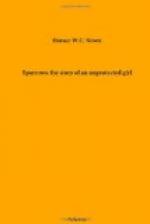Mavis believed that to tend her husband in the land where existence might prolong his life would be some atonement for the deception she had practised. When she got a further eminent medical opinion, which confirmed the previous doctor’s diagnosis, she set about making preparations for the melancholy journey. These took her several times to London; they proved to be of a greater magnitude than she had believed to be possible.
When driving to a surgical appliance manufacturer on one of these visits, she saw an acquaintance of her old days playing outside a public house. It was Mr Baffy, the bass viol player, who was fiddling his instrument as helplessly as ever, while he stared before him with vacant eyes. Mavis stopped her cab, went up to his bent form and put a sovereign into his hand as she said:
“Do you remember me?”
The vacant manner in which his eyes stared into hers told Mavis that he had forgotten her.
When Mavis’s friends learned of her resolution, they were unanimous in urging her to reconsider what they called her Quixotic fancy. Lady Ludlow was greatly concerned at losing her friend for an indefinite period; she pointed out the uselessness of the proceeding; she endeavoured to overwhelm Mavis’s obstinacy in the matter with a torrent of argument. She may as well have talked to the Jersey cows which grazed about Mavis’s house, for any impression she produced. After a while, Mavis’s friends, seeing, that she was determined, went their several ways, leaving her to make her seemingly endless preparations in peace.
Alone among her friends, Windebank had not contributed to the appeals to Mavis with reference to her leaving England with her husband: for all this forbearing to express an opinion, he made himself useful to Mavis in the many preparations she was making for her departure and stay in South Africa. So ungrudgingly did he give his time and assistance, that Mavis undervalued his aid, taking it as a matter of course.
Three days before it was arranged that Mavis should leave Southampton with Harold, her resolution faltered. The prospect of leaving her home, which she had grown to love, increased its attractions a thousand-fold. The familiar objects about her, some of which she had purchased, had enabled her to sustain her manifold griefs. Cattle in the stables (many of which were her dear friends), with the passage of time had become part and parcel of her lot. A maimed wild duck, which she had saved from death, waited for her outside the front door, and followed her with delighted quacks when she walked in the gardens. All of these seemed to make their several appeals, as if beseeching her not to leave them to the care of alien hands. Her dearly loved Jill she was taking with her. Another deprivation that she would keenly feel would be the music her soul loved. Whenever she was assailed by her remorseless troubles in London, she would hasten, if it were possible, to either the handiest and best orchestral concert, or a pianoforte recital where Chopin was to be played. The loneliness, sorrowings, and longings of which the master makers of music (and particularly the consumptive Pole) were eloquent, found kinship with her own unquiet thoughts, and companionship is a notorious assuager of griefs.




